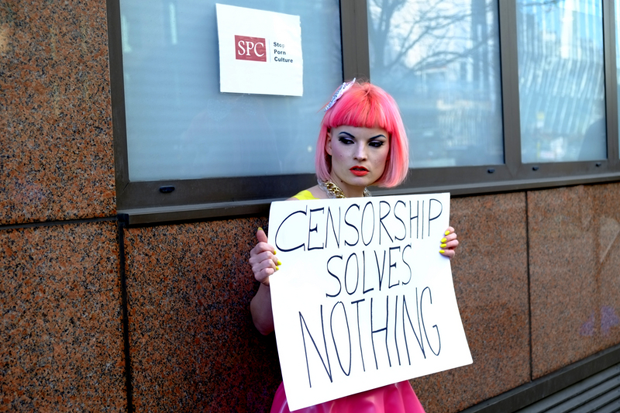This article is the part of the Index on Censorship Young
Writers / Artists Programme
By Jonathan Lindsell / 11 April, 2014
Protesters gathered outside a Stop Porn Culture conference
in March 2014 organized by Gail Dines. Protesters included porn stars,
filmmakers, artists, sex workers and supporters who believe in freedom of
expression.
 Protesters gathered outside a Stop Porn Culture conference
in March 2014 organised by Gail Dines. Protesters included porn stars,
filmmakers, artists, sex workers and supporters who believe in freedom of
expression.
Protesters gathered outside a Stop Porn Culture conference
in March 2014 organised by Gail Dines. Protesters included porn stars,
filmmakers, artists, sex workers and supporters who believe in freedom of
expression. Last year London Mayor Boris Johnson’s aide, Simon Walsh, was arrested for possession of extreme pornography: depictions of anal fisting and urethral sounding. The respected barrister’ very public prosecution tore his life apart and lost him his jobs. In just 90 minutes the jury threw out his case – Walsh’s images were safe and legally produced.
The law under which he was prosecuted (Criminal Justice and
Immigration Act 2008) was intended to affect only 30 people per year, but over
1,300 were prosecuted in 2012/13 alone. Clarification of what should be classed
as “extreme”, promised by the Lords, never materialised. Government lawyers
have attacked a wide range of materials, many of which juries consider
innocent.
Now the government is sneaking through a vast extension to
pornographic prohibition. It’s so vaguely worded that it could cover 50 Shades
of Grey (if filmed), Game of Thrones or Florentine statues. Those found guilty
of possession could face 3 years in prison and an unlimited fine.
Under the cloud of Cameron’s anti-child abuse crusade,
possessing explicit/realistic portrayals of “the non-consensual penetration of
a person’s vagina, anus or mouth by another,” real or simulated, will be
illegal. The rhetoric that launched Claire Perry’s disastrous internet
filtering initiative – the one that blocks abuse support, sex education and
suicide helpline websites – also mandated this law. That rhetoric displays
utterly muddled thinking, a confusion between stopping child abuse, stopping
children accessing adult material and stopping anyone accessing non-mainstream
material.
The change’s motivation is laudable. Genuine rape or abuse
depictions (i.e. filming real crimes) should be illegal, all agree. Some
women’s groups argue exposure to violent pornography affects viewers’
behaviour- RASASC calls the move a “step forward in preventing rapists using
rape pornography to legitimise and strategise their crime”.
However, campaigners contend the draft law’s language is too
ambiguous. A policy researcher from anti-censorship organisation Backlash
argues: “The law will cover much more than the legislators imagine or intend.”
Passing this law as an appendage in a “bumper bill (that includes) lots of
legitimate concerns – a radical overhaul of probation and legal aid – (means
this) very delicate matter isn’t getting appropriate democratic oversight”.
The government’s strategy, using child pornography as a
blanket justification, makes effective opposition or refinement impossible. No
politician spoke against the amendment in the bill’s readings or committee
stage. Which MP, mindful of re-election, would stand for the right to possess
violent erotica? Labour support the provision uncritically, denying it
appropriate scrutiny.
Such a serious proscription, which might endanger harmless
women and men, merits its own public debate, not back-door legislation.
Solicitor Myles ‘ObscenityLawyer’ Jackman, who represented Walsh, highlights
the dangerous subjectivity of judging pornography “realistic”, plus the
“absence of any evidence proving…a causal link” between such material and
Cameron’s “normalise(d) sexual violence against women”. A representative survey
of 19,000 UK adults cited by three academics shows 1/3 of adult fantasies include
domination or submission, and about 5% of Britons fantasise about
delivering/experiencing violence. These academics’ parliamentary evidence
repeated Jackman’s scepticism of the link between pornography and real-world
crime. Groups like Rape Crisis South London and the End Violence Against Women
Coalition assert such pornography does promote dangerous beliefs. The
government itself ”believes such images are unacceptable and most people would
regard them as disgusting and deeply disturbing,” implying the majority’s moral
distaste is grounds for legislation.
Groups like Sex & Censorship and Backlash protest the
bill’s wording and justification, arguing millions of law-abiding kink
practitioners might be criminalised for depicting safe, consensual, private
acts. Sexual minorities including the LGBT community, bondage enthusiasts,
horror-movie recreators and “vampire and goth enthusiasts who use fake blood in
roleplay” could be covered, Backlash told me. Even Rackley and McGlynn, the
Durham University academics who championed this law for years, criticise the
bill’s wording, demanding clarification specifically banning “realistic
images”, protection for “private depictions of consensual BDSM activity” and
consideration of context.
Sex-positive feminism raises questions over what the bill
would achieve. Arguments that violent pornography (and general sexual imagery)
warps childhood development, perpetuates objectification and enables rape
culture are valid, but attacking one subsection of pornography won’t stop
children seeing questionable images. They fill celebrity magazines, tabloids,
advertising and primetime TV.
In terms of child protection, then, this may be
window-dressing. It’s far more important for schools to promote effective sex
education covering consent, gender, identity and relationships, rather than a
“see no evil” approach. Such education is woefully lacking and outdated.
Meanwhile the government has cut funding for sexual health services for
vulnerable teens and youth services, and is attacking endangered women’s panic
rooms via the “bedroom tax”.
The government may be simultaneously attacking the harmless,
and harming those who are helpless. The extension of extreme pornography
censorship is dangerous because it’s had minimal public discussion, the wording
is poorly considered, and it’s unlikely to address the problem used to promote
it.
This article was published on April 11, 2014 at
indexoncensorship.org
No comments:
Post a Comment